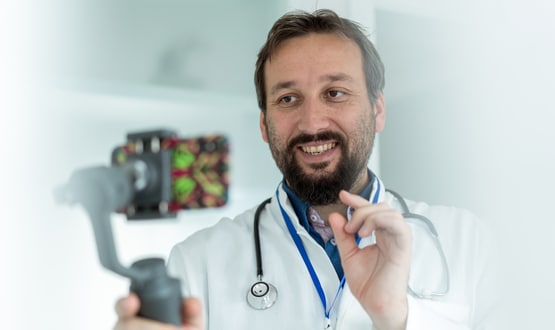YouTube is continuing its quest to verify health workers in the UK in a bid to battle disinformation being shared online.
Health professionals, including doctors, nurses and psychologists, have been able to apply for the verification scheme since June. In order to be successful, applicants must meet rigorous criteria dictated by YouTube. They will then be given a badge under their name on the online platform, which identifies them as a verified, licensed healthcare worker.
The scheme has been implemented to help fight the growing number of health videos that share misleading or potentially harmful advice.
In September 2021 YouTube introduced a new policy that saw video content that spread misinformation about approved vaccines removed from the platform. The company said at the time that it had removed 130,000 videos that fell foul of its new policy – including those criticising the covid-19 vaccine.
In 2022, research published in the BMJ determined that 11% of YouTube’s most viewed videos about the covid-19 vaccine contradicted information from the World Health Organisation or the US Center for Disease Control and Prevention.
The health verification scheme will bring a level of confidence to the content that people are watching. If users are looking for information on a health topic they will be shown a ‘health shelf’ at the top of the search results. This is a list of videos that will be clearly labelled as being from verified health sources.
According to the BBC, Vishaal Virani, who leads health content for YouTube, has confirmed that the verification scheme is a multi-step process and involves collaboration with the Academy of Medical Royal Colleges (AoMRC), the NHS and other stakeholders such as the Royal College of Nursing.
To achieve the verification, YouTubers must hold an active medical licence and not have posted any videos containing disinformation in the past.
YouTube is part of the Google family. DigitalHealth spoke exclusively to Google’s chief health officer, Karen DeSalvo, in June, as the verification programme was just starting, where she spoke of the company’s ambition to become the responsible face of health knowledge. “We have a really bold ambition to help billions of people be healthier,” she explained. “And that’s everyone everywhere; not some people, some places. We have this mission that we want to build inclusive technology and information that brings everybody along.”
At the time she noted that YouTube provides a particular opportunity for the company to identify trusted professionals.
No one at Google was immediately available to provide comment.

